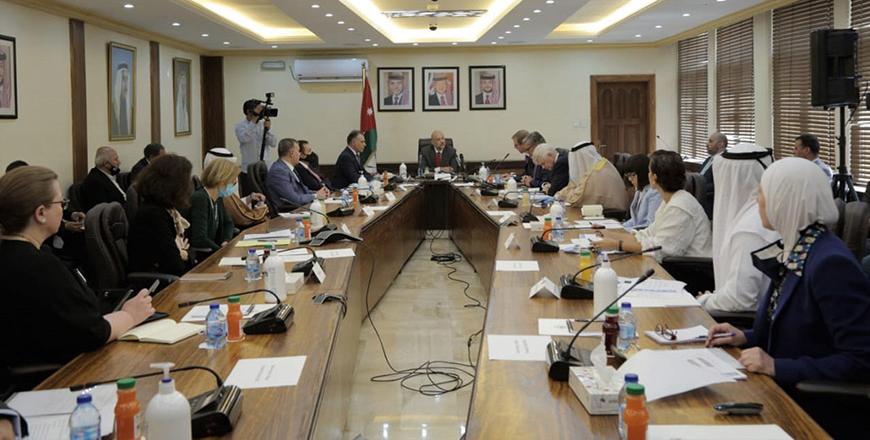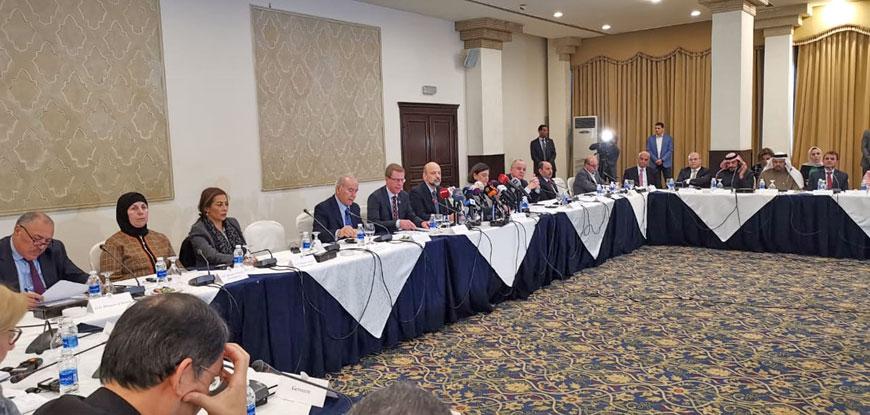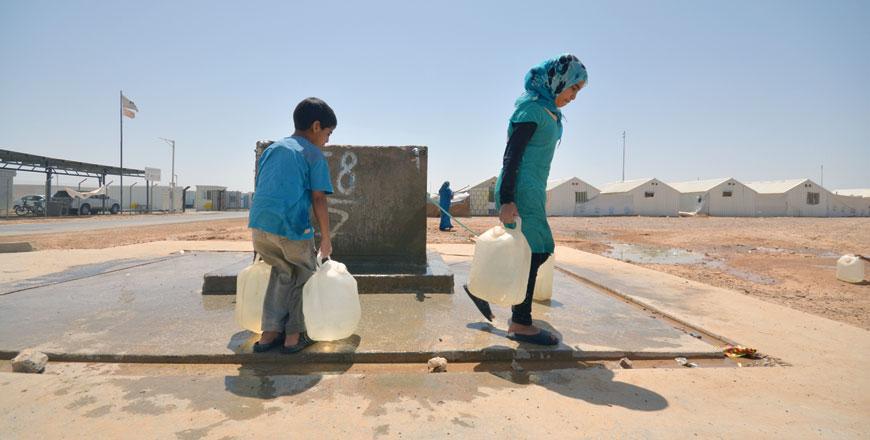You are here
$6.6-billion Jordan Response Plan for Syrian crisis endorsed
By Rana Husseini - Jun 22,2020 - Last updated at Jun 23,2020

Prime Minister and Minister of Defence Omar Razzaz chairs a meeting to endorse a $6.6-billion Jordan Response Platform for the Syrian crisis for the years 2020-2022, attended by ministers, representatives from UN agencies, diplomatic missions and int'l organisations on Monday (Petra photo)
AMMAN — Jordan and the international community on Monday endorsed a $6.6-billion Jordan Response Plan (JRP) for the Syrian crisis for the years 2020-2022.
The endorsement was announced during a meeting held under the patronage of Prime Minister and Minister of Defence Omar Razzaz and attended by ministers, representatives from UN agencies, diplomatic missions and international organisations.
During the meeting, the gathering agreed that the endorsed JRP will be considered the “sole reference” to identify the needs for reducing the impact of hosting Syrian refugees, boosting host communities and supporting the Treasury.
"Your partnership and support in shouldering the impact of the Syrian crisis in Jordan are invaluable and have helped Jordan in staying resilient in a very difficult regional setting," the premier told the gathering.
Razzaz reiterated the Kingdom's "noble humanitarian stance on refugees".
"The resilience of Jordanians and the system in Jordan, as well as our commitment to meet our obligations towards those who looked at Jordan as their only safe haven, were the grounds for our solidarity that made us a model of stability in such global turmoil," the prime minister said.
Razzaz added that countries that receive and host refugees, often for extended periods, “make an immense contribution from their own limited resources to the collective good, and indeed to the cause of humanity”.
“It is imperative that these countries obtain tangible support from the international community as a whole in leading the response,” he noted.
“The refugee crisis is a test of our character, and we have proven our hospitality and commitments throughout history. At present, the situation is compromising the state of the country economically, environmentally and socially,” he said.
Over time, Razzaz maintained, providing for basic needs, such as education, health services, cash assistance and protection has heightened the pressure on the Kingdom’s resources.
“Still, with your support, we are capable of continuing,” he said.
However, Razzaz was quick to point out that the country is experiencing budget constraints.
“Jordan is now in a phase that no other country has ever been through. The impact of the war in Syria is still ongoing, and it is not over yet. The voluntary return rate is weak, as refugees do not intend to go back anytime soon, and more refugees are living within host communities in the Kingdom,” Razzaz stated.
In addition, the premier added, Jordan and the world are battling COVID-19, which is making “every nation” more vulnerable.
“We all have to stand hand-in-hand in order to face this tragic situation, which has impacted the economy, increased debt and increased unemployment among Jordanians and Syrians, mainly among daily wage workers who have suffered due to the lockdown imposed to reduce the spread of the virus,” Razzaz said.
The premier pointed to His Majesty King Abdullah’s comments during the COVID-19 crisis: “The past months dealing with COVID-19 have shown us that we all need each other to survive. The lessons we learn must help us seek a better integration of our world, a ‘re-globalisation’ that sees relations based on building capacities, ushering in cooperation and putting the wellbeing of all peoples first.”
Also addressing the gathering, Minister of Planning and International Cooperation Wissam Rabadi said that for six years, the JRP “has proven to be a successful tool of the strong partnership that has united everyone” to work for the benefit of Syrian refugees and host communities.
“Partnership, solidarity and resilience are the key pillars that have brought us together over the past few years and it is critical that we continue with your support on this path,” Rabadi said.
Additionally, Rabadi maintained, the JRP has always been a model in the region for the Syria response, where partners from the government, the UN, donors and NGOs have collaborated to cover the humanitarian and resilience needs of vulnerable refugees and Jordanians impacted by the Syrian crisis.
“As you already know, regional crises [including the Syrian refugee influx] have taken a great toll on Jordan as we continue to host over 1.3 million Syrians. Vulnerability has increased not only among refugees, but also among Jordanians, which has caused additional pressures and impact on the Kingdom’s economic growth and employment,” the minister said.
Rabadi cited a recent World Bank report (“The Fallout of War”), which states that the Syrian conflict has had a “sizeable negative impact” on its neighbours’ gross domestic product (GDP).
“For Jordan, GDP growth has slowed down by 1.6 per cent solely because of the conflict in Syria. The report clarifies that in the absence of refugees, Jordan’s GDP would have grown 3.1 per cent faster (at 5.5 per cent instead of 2.4 per cent). The same report concludes that the Syrian crisis and the influx of refugees have exacerbated unemployment and poverty rates in Jordan,” Rabadi pointed out.
The Planning minister stressed the Kingdom’s commitment towards ensuring the welfare and self-reliance of Syrian refugees, adding that “this has translated into a set of policies to ensure welfare and protection of refugees both on short and medium-term in protection, livelihoods and labour market education, health and social protection”.
“We continue to honour our moral obligation towards Syrian refugees and we will continue to do so until the conditions for a safe and dignified return exist,” Rabadi added.
The minister pointed out that the field of health, education, social protection and livelihoods are the main priorities to be supported under the JRP, especially in light of the coronavirus pandemic.
“This is where we urge you to continue supporting us in order to mitigate the impact of the pandemic on Syrian refugees and enable the government of Jordan to sustain services for them,” the minister stressed.
Meanwhile, UN Resident and Humanitarian Coordinator in Jordan Anders Pedersen, who delivered a statement on behalf of the international community in Jordan, said the “hard work” on the planning, implementation and monitoring of the JRP over the last six years has proven to be a “catalyst to and a cornerstone of” the strong partnership between the international community and the Government of Jordan.
“Since the launch of the first JRP in 2014, we have collaborated to ensure that Syrian refugees and the often vulnerable communities, in which they live continue to receive the life-saving and life-sustaining humanitarian assistance they need. Over the years, this assistance has evolved to increasingly focus on integrated, dignified solutions that increase the resilience and choices of people in need,” Pedersen said.
With the Syrian Crisis now in its 10th year, Pedersen added, Jordan remains a “global example of unwavering hospitality and inclusiveness” for over 657,000 Syrian refugees.
“We know that this generosity has come at a cost to the country’s finances, its infrastructure and indeed, its eco-system. The international community has continued to recognise its role in helping to shoulder these additional costs as a partner to support programmes and initiatives for refugees, but also to advance the lives of Jordanians,” Pedersen said.
The UN official praised the Kingdom’s efforts and other local and international agencies in their “strong planning and cooperation”, which “have prevented the spread of COVID-19” in the country’s most vulnerable areas, in particular crowded refugee camps and densely populated underprivileged areas.
“These efforts reinforce the efficiency and efficacy of an inclusive national system, which provides for all those living in Jordan,” Pedersen added.
He also commended the government’s steps to integrate vulnerable households into labour protection schemes.
“We likewise welcome the expansion of work permits for refugees into new sectors, recognising that permits do not systematically translate into additional jobs and revenue generation but do offer a critical layer of protection and formalisation for workers,” the UN official said.
Pedersen added that the international agencies will continue to work with the Jordanian government to support gender-based analyses of programmes to ensure that new legislation protects workers, appropriately expands social security and social protection programmes, including the National Assistance Fund, and does not inadvertently exclude women, women-headed households and women-led businesses, either for Jordanians or refugees.
During the meeting, United Nations High Commissioner for Refugees (UNHCR) Jordan Representative Dominik Bartsch stressed that Jordan’s refugee camps are “free from COVID-19”.
“The world should not take Jordan’s generosity towards refugees for granted”, as the Kingdom has been and remains an “ideal host country”, offering refugees a decent and secure life, opportunities to productively engage in the local economy, he said.
What is remarkable, Bartsch added, is the fact that Jordanians still support refugees, with three out of four Jordanians still viewing the presence of refugees as “a positive thing”, according to research by the Pew Research Centre.
“We are grateful that the Jordanian government has included in its COVID-19 National Response Plan all the population within its borders, and this clear policy position has been crucial in containing the spread of the virus and protecting Jordanians and refugees alike,” Bartsch said.
The government’s “rigorous” response to COVID-19 carries important lessons on “how we work together to meet the medium- and long-term needs of refugees and their host communities, especially at a time when the prospects for returning to Syria do not seem imminent”, Bartsch added.
Related Articles
AMMAN — Jordan and the international community on Wednesday endorsed a $2.4-billion Jordan Response Platform (JRP) for the Syria Crisis for
AMMAN — The Ministry of Planning and International Cooperation has published a booklet on the new Jordan Response Plan (JRP) to the Syrian r
AMMAN — Minister of Planning and International Cooperation Wissam Rabadi attended a number of sessions during the Brussels IV conference on













